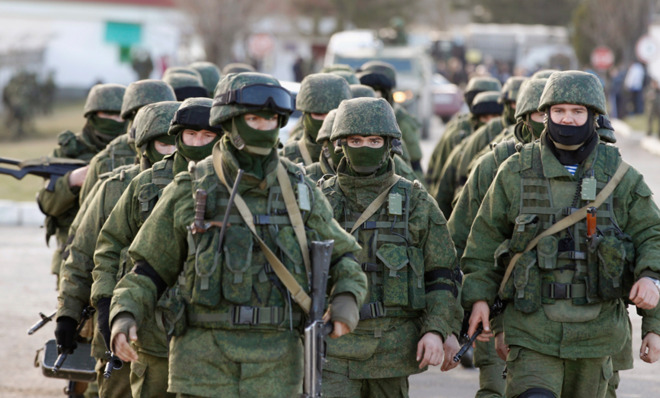How will the Ukranian conflict end?
With a process, not a bang or a whimper


A free daily email with the biggest news stories of the day – and the best features from TheWeek.com
You are now subscribed
Your newsletter sign-up was successful
Early in the Cuban Missile Crisis, President John F. Kennedy mused to his brother and other members of the Ex-Comm that the presence of American Jupiter missiles in Turkey, and the subsequent shift in the balance of world power that created, had probably triggered the rapid Soviet up-arming 90 miles to the South of Miami.
On the first day of the crisis, October 16, when pondering Khrushchev's motives for sending the missiles to Cuba, Kennedy made what must be one of the most staggeringly absentminded (or sarcastic) observations in the annals of American national-security policy: "Why does he put these in there, though? … It's just as if we suddenly began to put a major number of MRBMs [medium-range ballistic missiles] in Turkey. Now that'd be goddamned dangerous, I would think." McGeorge Bundy, the national security adviser, immediately pointed out: "Well we did it, Mr. President."
Once that was straightened out, Kennedy himself declared repeatedly that the Jupiter missiles were "the same" as the Soviet missiles in Cuba. Rusk, in discussing the Soviet motivation for sending missiles to Cuba, cited CIA Director John McCone's view that Khrushchev "knows that we have a substantial nuclear superiority … He also knows that we don't really live under fear of his nuclear weapons to the extent that he has to live under fear of ours. Also, we have nuclear weapons nearby, in Turkey." The chairman of the Joint Chiefs of Staff, Maxwell Taylor, had already acknowledged that the Soviets' primary purpose in installing missiles in Cuba was "to supplement their rather defective ICBM system." [Via The Atlantic]
The Week
Escape your echo chamber. Get the facts behind the news, plus analysis from multiple perspectives.

Sign up for The Week's Free Newsletters
From our morning news briefing to a weekly Good News Newsletter, get the best of The Week delivered directly to your inbox.
From our morning news briefing to a weekly Good News Newsletter, get the best of The Week delivered directly to your inbox.
McNamara would later say, adroitly, that the Cuban Missile Crisis was a domestic political problem for Kennedy. The challenge: either convince Americans that Cuban missiles were not any more of a threat than the Jupiter missiles were to Russia, or agree to get rid of the irritant — the Jupiter missiles — in the first place. The latter course is exactly the one Kennedy arrived at, with no thanks to his trigger-happy advisers.
How does the world extricate itself from a vehicle that looks like it's leading to war? Look at the domestic politics of Ukraine. The endgame here, and the functional goal of the United States and NATO, is NOT to pull Ukraine across the line into an insoluble economic and political relationship with Europe. Indeed, NATO membership for Ukraine has never been on the table. It would alienate Russia far too much and would be, frankly, unnecessary. Ukrainian independence, an ability to choose freely between Russia and the West, is a more sustainable status quo.
The overthrow of the government might have been Putin's casus belli, but it does mean that NATO will need to offer, along with carrots to Ukraine, the threat of a stick to Russia. As Christopher Dickey suggests, it might come in the form of a security guarantee, one that promises to defend the Ukrainian right to self-determination over the long-term. The long-term is key: This crisis will simmer for awhile. A process that allows Putin to claim that he successfully defended the Russian minorities in Ukraine without going to war, along with one that recognizes a future government legitimized by future elections (subject to UN or OSCE monitoring), is the proximate endgame. (I hope).
Both the West and Russia are going to have satisfy the demands of domestic politics. And NATO has a vested interest in actually mobilizing against Russia, for once, even if it does not intend to fight. Even if Putin knows that the West would never invade, a larger, well-coordinated NATO force, with weapons hot and red lines established, is simply not something he can easily ignore. Indeed, a NATO mobilization would give him the pretext to endorse or propose a process of sorts.
A free daily email with the biggest news stories of the day – and the best features from TheWeek.com
Marc Ambinder is TheWeek.com's editor-at-large. He is the author, with D.B. Grady, of The Command and Deep State: Inside the Government Secrecy Industry. Marc is also a contributing editor for The Atlantic and GQ. Formerly, he served as White House correspondent for National Journal, chief political consultant for CBS News, and politics editor at The Atlantic. Marc is a 2001 graduate of Harvard. He is married to Michael Park, a corporate strategy consultant, and lives in Los Angeles.
-
 Why is the Trump administration talking about ‘Western civilization’?
Why is the Trump administration talking about ‘Western civilization’?Talking Points Rubio says Europe, US bonded by religion and ancestry
-
 Quentin Deranque: a student’s death energizes the French far right
Quentin Deranque: a student’s death energizes the French far rightIN THE SPOTLIGHT Reactions to the violent killing of an ultraconservative activist offer a glimpse at the culture wars roiling France ahead of next year’s elections
-
 Secured vs. unsecured loans: how do they differ and which is better?
Secured vs. unsecured loans: how do they differ and which is better?the explainer They are distinguished by the level of risk and the inclusion of collateral
